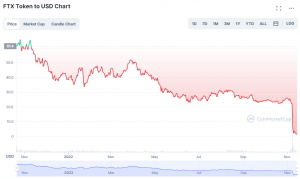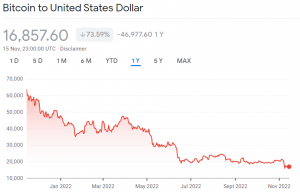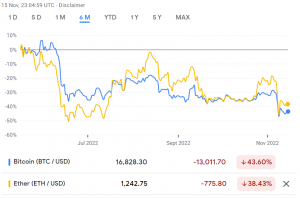I thought cryptocurrency was a thing – Richard Grimshaw, Green Associates Financial Adviser
On Friday 11 Nov 2022, the beleaguered crpyto exchange FTX filed for bankruptcy after a staggering five-day collapse of the once-$32 billion dollar crypto empire. The company is currently facing intense investigations in both the Bahamas and the U.S. for its handling of users’ assets.
FTX’s books revealed the exchange had more than $9 billion in liabilities, but less than $1 billion in liquid assets the day before its bankruptcy filing. After an apparent hack drained $477 million of the company’s remaining assets on Friday night, FTX’s customers are facing long odds of ever recovering much of their deposits. It is said that at least $1 billion in customer funds are unaccounted for, and FTX may owe as many as one million creditors.
As the business world tries to keep pace with this fast-moving story, Richard Grimshaw gives his take on the bigger picture about FTX’s collapse and its implications for the cypto industry.
Let’s dive in.
Okay, cards on the table… I have been a closer watcher of cryptocurrency investments since the early days of Bitcoin, but I have not yet found a reason to make an investment. I am a professional investor and financial adviser, and I am a self-confessed tech nerd and early adopter, so it has been hard to resist the urge to join the bandwagon.
The events of the past year, culminating in the collapse of the FTX cryptocurrency exchange this week, have confirmed my suspicions that the current version of cryptocurrency is dangerously flawed.
How have crypto markets and businesses been affected?
- Crypto’s total market cap has dropped below the $1 trillion mark since FTX’s trouble started early last week. After the firm’s bankruptcy filing, Bitcoing (BTC) sank nearly 25%, dropping below $16,000, before slightly recovering; Etherium (ETH) fell by more than 30% in the same span.
- Market contagion and liquidity issues have spread to a growing number of crypto businesses, from lenders including Genesis Global Capital, BlockFi, and Voyager to web3 VCs like Paradigm, Ikigia, and Galois. Voyager, a bankrupt lender that FTX had planned to purchase for $1.4 billion, no longer has a buyer, meaning its customers might not be able to recover funds.
- FTX’s collapse has also disrupted the Solana ecosystem. The exchange was heavily invested in SOL and many of Solana’s DeFi projects were also allegedly backed by FTX. The token lost more than 60% of its value in the week after rumors of FTX’s insolvency began.
The Good
Cryptocurrency is very secure in its design. It uses something called a block chain to create this security. Imagine that you have one million things that are identical, but stored in a million different physical locations. Those million things constantly look at the other duplicates, and if they are not exactly the same ALL the time, the damaged one is deleted and replaced. This is the concept of a block chain. By having such a large number of identical units constantly checking against each other, any attempt to hack one or more of the chain elements, would fail because unless you hack them all in an instant, they will delete the hacked ones and continue.
I have used generic terms here to explain the concept. If you want to know more, I suggest you review this YouTube video from MrWhosTheBoss which is the best explanation of how it works that I have seen.
Cryptocurrency is not country based, and has no regulation. You are buying direct from a seller, and there is a limited supply of each cryptocurrency. You don’t know the identity of the person you are trading with – it’s anonymous. It’s a universal currency not impacted by economic conditions of the country that in which it is traded in.
The Bad
There are many different cryptocurrencies available in the market. Some were created to give diversity to the new market. Established mainstream currencies like Bitcoin and Ethereal are well known. However, less serious endeavours like the joke currency DogeCoin, were so widely traded that it became mainstream by accident, thanks to the sheer volume of trades.
There is no real barrier to entry for a new currency to emerge. If you have a powerful enough computer, you can create these blockchains (called mining), and although there is a limit to the number you can create, there is no limit to the number of currencies that can emerge. It may surprise you to learn that at the time of writing, there are over 12,000 currencies available, and half of these appeared in the last year alone.
The Ugly
The market for conversion of cryptocurrencies to real currencies is the job of an exchange. These markets are unregulated and created by entrepreneurs to give real value to these currencies. Up until this week, the most well-known were Binance and FTX… but there are 57 separate exchanges that I have found. The volume of trading in these exchange companies made their founders extremely wealthy. A FTX Token, required to trade on the FTX exchange, was $80 a year ago – today it is worthless as the exchange filed for bankruptcy.

Now we have over one million owners of cryptocurrency through FTX, unable to convert their “investments” into real currencies, with an estimated loss to investors of over $1.49B from this collapse alone.
The fear from the investors that they may not be able to convert back to real currency is what brought down FTX ultimately, but as we look at the actions within the company after its collapse, disturbing actions of the management and owners is emerging. Please refer to the excellent summary from ABC Online to learn more about the collapse.
This collapse surprised many in the market because Sam Bankman-Fried was seen as the sane and rational person in a crazy industry. As one of the world’s richest men, he has been influential in political spheres concerning the regulation of the industry. As a powerful lobbyist, he spoke with honesty and candour about the vision of crypto to the highest levels of power in the US. See this report from CoinGeek in December last year.
Summary
What can you expect as a cryptocurrency investor? Well, it’s going to be a wild ride!
Understanding the currency requires some facts to be laid down. Let’s focus on Bitcoin.
There are 21 million coins in existence, of which 19,144,112 are in circulation (being traded). Roughly 900 new coins are mined every day.
Want to know more? Check out this article.
The chart below of the most well-known currency, Bitcoin, illustrates the volatility point. If you owned the first Bitcoins, they rose in value from the original traded price in July 2010 of USD$0.0008 to $68,649.05 on 10 November 2021. Today, they are worth less than $17,000. The fall, illustrated in the chart below from Google, confirms that your loss for the year would have been 73.59 per cent.

If you think I was cherry-picking the choice of coin for the chart, look at the second most well-known coin alongside Bitcoin – Ethereal.
In the last six months alone, both have fallen by around 40 per cent.
In these charts, note that twice this year the coins’ values experienced worse crashes than the established equity markets did during the GFC or COVID-19.

Following the failure of FTX, the US government is ramping up its plans to regulate cryptocurrency exchanges for the protection of investors, but it remains to be seen how effective that regulation will be given the influence that these entrepreneurs have in government circles. It is well known that political processes in the US often require significant financial motivation to be set in motion, and these exchanges have a lot on money to throw at politicians who can protect their interests. It will be an interesting tug-of-war between protecting the consumer and allowing a new industry to rebuild confidence and thrive into the next decade and beyond.
If you would like to discuss how all this might affect your personal situation, talk to our team on 1300 815 921 or at info@greenassociates.com.au to book an appointment with an advisor.
At Green Associates, all of our advisers are fully licensed and listed on the ASIC Moneysmart Financial Adviser Register. Green Associates is committed to providing the best solutions for you and your wealth-creation journey.




